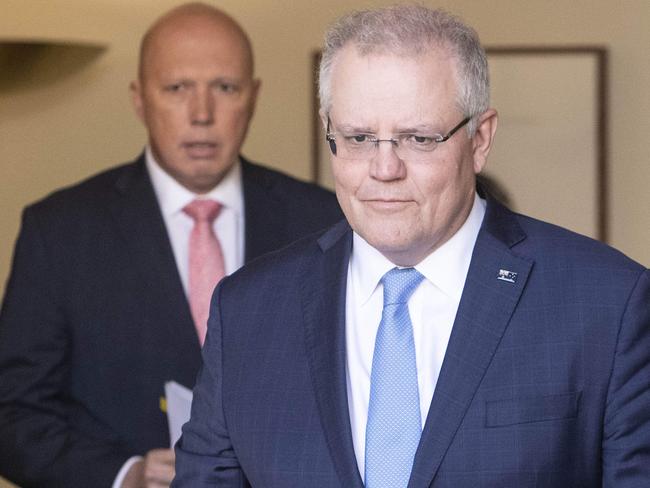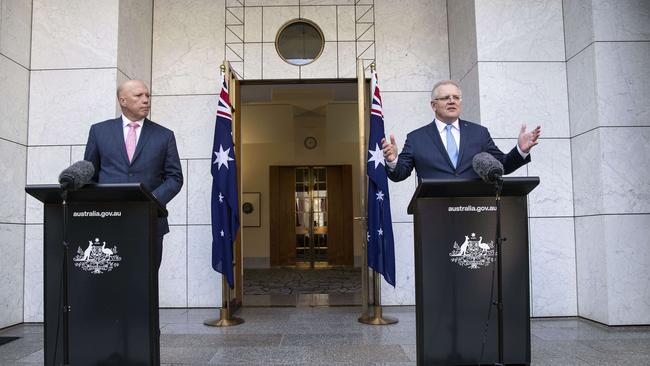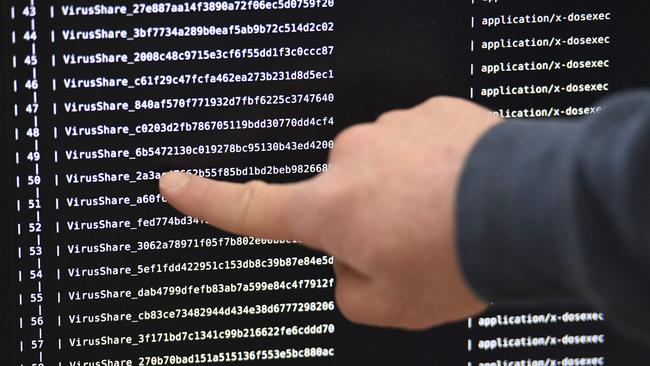Scott Morrison’s new cybersecurity plan to expand AFP powers to fight cybercrime
Scott Morrison and Peter Dutton have revealed new police powers to target paedophiles, terrorists and those linked to the trafficking of drugs like ice that are being pedalled to children.
Crime in Focus
Don't miss out on the headlines from Crime in Focus. Followed categories will be added to My News.
- Mums and dads being ‘held to ransom’ by cyber crims
- Light bulbs, locks and doors: 10 ways your home can be hacked
Cyber criminals lurking in the “darkest corners” of the internet will be brought to justice and critical online infrastructure strengthened to fend off hackers.
The federal government has unveiled further details of its $1.67 billion 2020 Cyber Strategy including a $66 million boost to help telcos, banks, health, energy, water, transport and online shopping businesses identify and fix vulnerabilities to stop foreign actors hacking their networks.
A further $88 million will bolster the Australian Federal Police’s capability to investigate and prosecute cybercrimes.
The 2020 strategy also includes the $1.35bn investment into the Cyber Enhanced Situational Awareness and Response package to ensure that the Australian Signals Directorate can identify more cyber threats and disrupt foreign criminals, which was announced last month.
Prime Minister Scott Morrison said it was important “now more than ever” to protect Australians online from those who “seek to do us harm”.

“We want to enlist all Australians in the fight to create a more cyber safe Australia; you are our secret weapon in our cyber security strategy,” he said.
“And we want to give you he tools to protect your family and your business.”
Cyber threats have become a growing concern during the pandemic, with authorities disrupting dozens of coronavirusthemed email and SMS phishing campaigns designed to harvest information or install malicious software.
It is estimated that cyber incidents targeting Australian businesses cost the economy up to $29 billion a year.
When asked how much of this new strategy was about China’s cyber threat to Australia, Mr Morrison said: “It’s about Australia, it’s about protecting Australia and Australians from wherever potential threats come and — in — and whatever form those threats make tight and those threats emerge in all sorts of circumstances and Minister Dutton I think has set out those very clearly.”
He went on to add: “Some weeks ago when I outlined the defence capability plan indicated there were a range of threats there and state actors that we have to deal with and we’ll continue to deal with.
“Wherever the threat comes from we have to be able to deal with it and there are state actors who are active in this space and we have to be able to come to terms and deal with that and are.”
Home Affairs Minister Peter Dutton told reporters paedophiles and terrorists should be worried about these new powers given to the Australian Federal Police.
“If you’re a … paedophile you should be worried about these powers, if you’re a terrorist you should be worried about these powers if you’re committing serious offence in relation to trafficking of drugs, of ice, for example, that’s being pedalled to children, you should be worried about these powers as well,” he said.
MORE NEWS
Aussie mum nabbing cyber crims taking your cash
‘Alarming’: Australia must expose foreign cyber spies
Huawei infiltrates Australia despite Chinese espionage risks
Chinese espionage: ‘They’ve targeted Australia’
“This is a power that enables the Australian Federal Police and the Australian Criminal Intelligence Commission to help stop paedophile networks online, for example, operating in the dark on encrypted devices, and that’s the reality of the modern world.
“ … the fact is at the moment we have seen a massive spike in the number of paedophiles online during the COVID-19 period. They are targeting kids because they know kids are at home.
“As a parent of teenage children, perhaps your girls are more well behaved online than mine … but while they’re telling you that they’re studying, if Fortnite is on in the background or TikTok, don’t be surprised, and the reality is people are trying their best to groom kids online and terrorists are spot information, people are trading gun parts on the dark web and it cannot be a lawless space. This law applies to those people and those people only.”
WHAT IT MEANS FOR AUSTRALIANS
What is Australia’s Cyber Security Strategy 2020?
It is a $1.67 billion, decade-long project designed to protect essential services, government organisations, businesses and individuals from online threats and attacks from criminals and foreign spies.
Didn’t Australia already have a cyber security policy?
The 2020 Cyber Security Strategy replaces a policy from 2016 that expired earlier this year. The new strategy delivers more than three times the funding of the previous model, which committed $230 million to the issue over four years.
What’s different in the 2020 cyber security policy?
This policy covers new ground, particularly in law enforcement.
It includes an $89.9 million boost for the Australian Federal Police to create teams focused on cyber criminals, and a huge funding injection for the Australian Signals Directorate to recruit staff.

It’s understood the Directorate will play a greater role in providing intelligence about cyber attacks on Australia’s own infrastructure, rather than just attacks overseas, under laws to be introduced later this year.
The Australian Cyber Security Centre, based within the ASD, will also receive $31.6 million to “counter” foreign cyber criminals.
Under the new policy, the Government will also introduce laws governing minimum cyber security requirements for organisations maintaining critical infrastructure, which are increasingly being targeted by criminals, as well as minimum standards for businesses and their directors.
Where will the $1.67 billion go?
Most of the policy’s record funding will go towards detecting and prosecuting cyber attacks and attackers.
Five hundred intelligence and cyber security personnel will be recruited for the Australian Signals Directorate, which is responsible for cyber warfare, foreign intelligence, and information security.
Recruiting these “cyber detectives,” as Home Affairs Minister Peter Dutton called them, will cost $469.7 million.
Administration of the program as well as greater “intelligence capabilities” will cost an $385 million, and additional law enforcement measures will cost $124 million.
Why is the Government throwing so many resources at this?
Australians are facing increasing attacks online.
More businesses are having their files stolen in ransomware attacks, and foreign governments are hiring highly organised hacking teams to attack Australian organisations.
Figures in the 2020 Cyber Security Strategy report show federal and state government departments, health firms, education and individuals suffered the greatest number of “cyber security incidents” between June 2019 and 2020.

It also noted that “the scale and sophistication of cyber threats continue to increase”.
Mr Dutton also named terrorists, drug dealers, and paedophile networks operating on the Dark Web as targets of the new strategy.
Is this related to the Prime Minister’s cryptic cybersecurity announcement in June?
Yes. Prime Minister Scott Morrison said the response to his announcement about “cybersecurity attacks in recent times” received a “fantastic” response from businesses which were urged to update their security and software to prevent digital threats.
While not naming the country involved — widely thought to be China — Mr Morrison had announced that Australian organisations were facing a growing number of attacks from a “sophisticated state-based actor”.
Is there anything new to help individuals?
There are a few important additions for everyday internet users who aren’t running critical businesses but are just as vulnerable to cyber attacks.
The most notable addition is a cyber security hotline they will be able to phone for advice and if they fall victim to an online attack or scam.
The hotline will also be available for small businesses, and is expected to cost $12 million.
The Government has also pledged to create a voluntary code of practice for smart home gadgets, also known as Internet of Things devices, that are regularly found to feature security flaws, putting owners at risk.
The policy will also see $4.9 million used to create a public awareness campaign targeting vulnerable groups, and $12.5 million invested in new ways to detect malicious online activity and block it before it reaches your data or inbox.
Who was responsible for creating this policy?
An Industry Advisory Panel headed by Telstra chief executive Andy Penn made recommendations to the Department of Home Affairs.
The panel also included former US Home Security Secretary Kirstjen Nielsen, and representatives from Tesla, NBN Co, Northrop Grumman, and Vocus Group.
More than 200 submissions from businesses and individuals collected from last September were also considered, in addition to public consultations and workshops.
